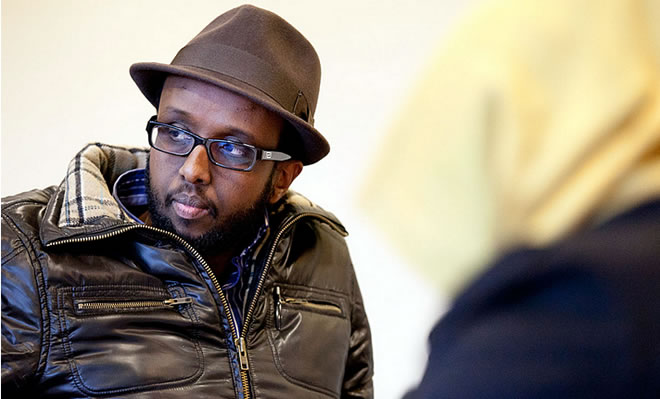
By Mukhtar Ibrahim
Saturday, June 27, 2015

Liban Dirie, pictured here on Nov. 4, 2011, is in danger of being sent to Somalia, where terrorists have threatened to kill him. When he lived in Minnesota, Dirie, also known as Ilyaas Maow, worked to stop the recruitment of local Somali youth by al-Shabab. Nikki Tundel | MPR News 2011
A journalist and longtime prominent member of Minnesota's Somali community is in danger of being deported from Canada to Somalia, where the terror group al-Shabab has allegedly threatened to kill him.
Liban Dirie, also known as Ilyaas Maow, came to Minnesota from Canada in 1998 looking for asylum. He was the founder and publisher of the now-defunct Mogadishu Times, an online news site. He worked with the U.S. government in support of its outreach efforts to prevent young people from being recruited as terrorists overseas.
But his past has caught up with him.
The government of Canada has notified Dirie, 47, that he is "criminally inadmissible to Canada" and that it will conduct a "complete review of the circumstances surrounding your application you submitted to immigrate to Canada." Among the possible outcomes is deportation to Somalia.
The government will make its decision after an interview with Dirie on Monday.
U.S. Rep. Keith Ellison, D-Minn., credited Dirie with exposing "Al-Shabab's lies" and said he had helped save "a lot of kids in Minnesota."
"The Canadian government should do everything it can to find a compromise that does not deliver Ilyaas into the hands of the terrorists he worked so many years to defeat," he said.
The United States rejected Dirie's asylum request in 2005, citing a decades-old Canadian charge of domestic assault against his wife. His application for a green card was denied. Trapped in an immigration limbo, Dirie began exploring his options. Some advised him to go to Somalia.
He knew that was a bad idea.
At the Mogadishu Times, Dirie had made videos condemning al-Shabab, which was trying to recruit Somali-American youth from Minnesota. One of the videos attracted more than 160,000 views.
Al-Shabab allegedly sent him email messages threatening to kill him if he came back to Somalia.
"You hypocrite who works with the infidels, we are warning you that we'll cut your throat," an email from al-Shabab in 2013 allegedly said. "You will come to Somalia one day and you will pay the price of what you write on your website."
His website was also hacked multiple times.
Last year, Dirie faced a new threat in the form of an illness. In early 2014, he said, he started seeking treatment for liver disease, but he could not find insurance to cover his medical expenses.
"I thought to myself that I was going to die inside my home if I don't get treatment," he said. "So I decided that I should at least try to go back to Canada and face the charges brought against me."
"I never committed what I was accused of," he said. "I wanted to defend myself before the court against the accusations."
After he arrived in Ottawa he turned himself in to authorities. He pleaded guilty to threat and property damage charges and served a month in jail. He took the deal because he was desperate for medical attention and did not want to spend a lot of time in prison, Dirie said.
His ex-wife, Hamdi Nur, said in a phone interview from Toronto that they were a young family when the incident happened more than 20 years ago. She said the incident "was not serious."
"We're friends, and he's a friend with his daughter," who's 23 years old, she said.
Abdirahman Mukhtar, youth program manager at the Brian Coyle Center, said Dirie was a "man of many talents" who played an important role in educating people about the dangers of terrorism and recruitment.
"When a lot of our media and community members, including leaders and scholars, were afraid to speak out against terrorism and extremism, he was the guy who was doing that on his website and videos," Mukhtar said.
When Dirie left, "We did not have the ISIS recruitment issue," said Mukhtar. His absence has created a void, especially his role in educating parents and the community about youth recruitment.
Dirie acted as a bridge between the Somali community and mainstream Minnesotans by posting bilingual articles and informational videos on his website, he said.
In a video posted on his YouTube channel in 2011, Dirie asked more than a dozen Somali-Americans why they love Minnesota. "It feels like home," one said. "It's home. The food, the diversity, the lakes, Lake Calhoun, the Bandshell, Lake Harriet."
Dirie was part of the Somali-American Advisory Council set up by former U.S. Attorney B. Todd Jones during the height of the federal investigation into the exodus of young Somali men from the Twin Cities to Somalia.
He also worked on community outreach efforts with Special Agent E.K. Wilson, who led the Minneapolis investigation.
"We need more people like him to step up and promote the Somali-American community in a positive light, and work on efforts in the community to counter the efforts of radical extremists," Wilson said.
Mukhtar said Dirie had the courage to stand up to al-Shabab. "We don't have a lot of individuals who have the talent and skills, but also the courage, to do that kind of work," he said.
"If he was here I believe he could have played a really huge rule," Mukhtar said. "Deporting and sending him to Somalia is a really a death sentence to him."